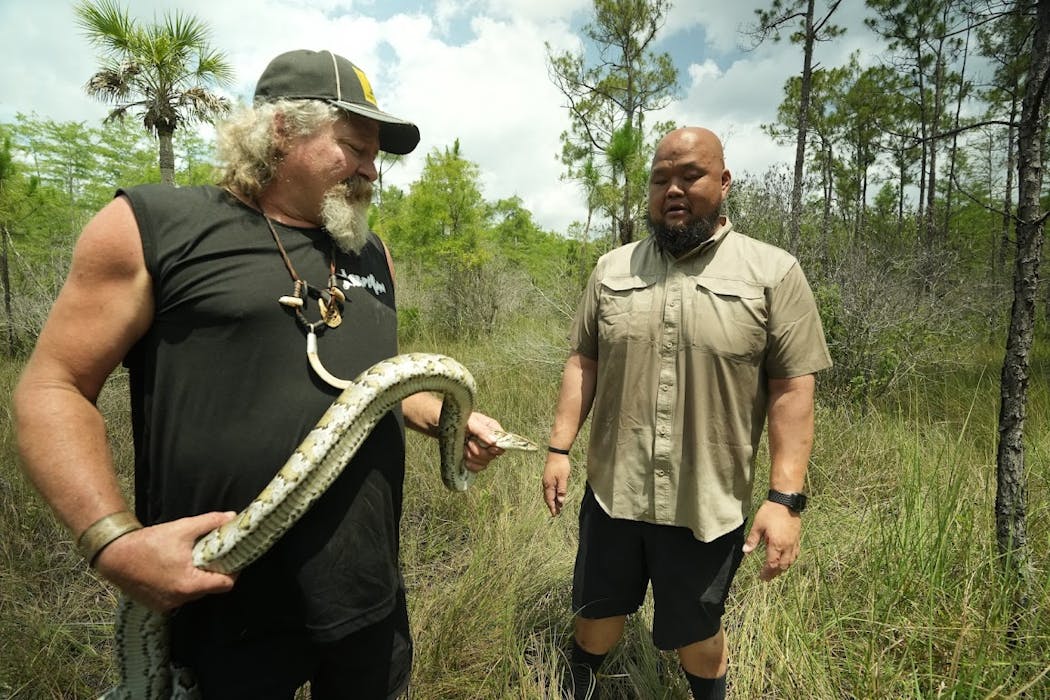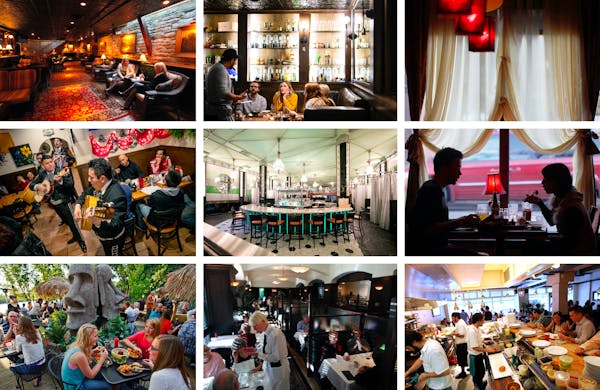Some people will put up with a lot on the job. But Yia Vang? He was bitten by a Burmese python in the Florida Everglades. On camera.
That was just one workplace hazard for the Minnesota chef's new gig hosting the Outdoor Channel series "Feral." The show, which premieres Nov. 28, has Vang learning to hunt the invasive species that are threatening ecosystems across the United States, and then using his cooking skills to demonstrate how tasty they can be.
"It bit me," he says on the show after he turns his razor-toothed foe into dinner. "So I bit it back."
Episodes of "Feral" find the Union Hmong Kitchen chef cooking up Chinese mystery snails in Wisconsin, lake trout in Yosemite National Park, iguanas in Fort Lauderdale, and walleye habitat-destroying crayfish in Minnesota. ("If you know anything about Minnesotans," he said, "don't mess with their walleye.")
It's his first series on a national network, though Vang is already a familiar face on Twin Cities screens. He is the host of the TPT series "Relish," in which he interviews local chefs about dishes from their cultures. This summer, he appeared on the Netflix "Iron Chef" reboot, which gave him a national platform to showcase his Hmong cooking. He also gained prominence this year with a James Beard Award nomination for best chef in the Midwest.
"Feral" isn't his only new TV project. He's featured in a Minnesota-themed episode of "Dirt," a YouTube show for Huckberry, an outdoorsy menswear line. And he's appearing Dec. 16 in the PBS series "Craft in America" — the episode focuses on St. Paul's Hmong community.
Vang uses all of these opportunities to share the story of his family, his community and, especially, his food. When it premieres, "Feral" may be the first national television show to have a Hmong host, according to its producers.
"It's somewhat groundbreaking," said Mitch Petrie, vice president of programming for Outdoor Sportsman Group, which owns the Outdoor Channel. "It's important. We have a strong Hmong population here, and I think it's just a great opportunity for the world to get to know Yia and his cooking."
"Feral" is a production of Intuitive Content, the Andrew Zimmern-led company that has been creating television vehicles for Minnesota culinary talent, such as Zoë François' "Zoë Bakes" on the Magnolia Network.
Patrick Weiland, senior vice president of production and development for Intuitive Content, said Vang was the perfect star for "Feral" because "he's not a cookie-cutter host."
"Yia is so authentic, and he's got this vulnerability," Weiland said. "He's not over-rehearsed, he's a new talent, but it comes from the heart. He's connected to his heritage in a really special way and isn't afraid to draw those comparisons. It's everything that makes somebody a great TV host."
Close family connections
When the company approached Vang about "Feral," it was clear to him from the start that this would be one more way to expose a wider audience to Hmong culture.
"Right away, I said, this show is so Hmong, it's not even funny," Vang said. "The idea that you're going to go into the unknown to harvest and hunt these animals, and find a way to cook it — that is so core to who we are as the Hmong people."
The first part of each show puts Vang in the wilderness with guides, where he learns the techniques to catch wild boar that are trampling a farm, or diving for lionfish off the coast of Florida. "I'm kind of like a fish out of water, no pun intended," he said.
The second part goes where Vang is most comfortable — the kitchen — where both he and the guides show each other how they would prepare the animals in a dish. While it's certainly not a vegetarian-friendly series, by focusing on invasive species, the show raises issues of conservation, the challenges of farming and the introduction of alternative food sources.
"This show is meeting all these kinds of hunters and gatherers, because they can help restore balance to the environment by getting [the invasive species] out of there," Weiland said.
And the process uncovered more connections to Vang's family history than he thought possible.
He told his father he was going to south Florida to hunt iguanas, a lizard that proliferated there after people released their pets into the wild. It turned out that his dad had hunted iguanas in Laos when he was a kid. "He's like, 'They were up in the trees and we would shoot them down.' And then he goes on to explain, 'This is how you make the best iguana.' And then I'm in Fort Lauderdale making the iguana with the same recipe my dad used over 60 years ago in the hills of Laos."
Vang's mother taught him how to catch and cook the Chinese mystery snails, the same way she would catch them in streams when she was younger.
"For me, as exciting as this show is, it's this connection" with his family, Vang said, that makes it meaningful. "That we have this ability to keep talking about my parents, their legacy, their heritage, their lineage."
'Just another platform'
Filming has kept Vang busy traveling the country, but this and his other TV appearances haven't led him astray of his local responsibilities, which include the Union Hmong Kitchen booth at Graze food hall in Minneapolis' North Loop, and ongoing pop-ups and fundraising for his long-awaited next restaurant, Vinai.
His heart is in the food. He knows not everyone will believe that.
"There's always that whole, 'Oh, yeah, he gets into TV and then forgets about the restaurant and the food quality sucks, it's just about him and his stardom,'" he said.
"I made it very clear to our staff and to everybody close to me that this is just another platform for us, as much as being able to be at the State Fair, or being at Graze or doing our residency. I'm just gonna work on a different platform, but we're still talking about the same message. It hasn't changed.
"And that message is that there's a story behind every kind of food. But for me, it started with Hmong food."
Vang's curiosity and openness to learn new things are what sold Petrie on the show, the Outdoor Channel executive said.
"In our genre, we have a lot of experts in the world of hunting and fish, and my draw to him was that he doesn't present himself as an expert," he said.
Which might explain the python bite.
Vang didn't mind it too much. "It doesn't hurt because their teeth are so sharp, it's like a syringe. But the fact that there was a creature dangling on your hand? That's the part where you're like, 'Huh, interesting.'"
At least he can say he lived to tell the tale.
"With my buddies, that's my card," he said. "I'm like, 'I'm sorry, did you have a hard day? Yeah, I got bit by a snake.' "
Streetscapes

Critics' picks: The 12 best things to do and see in the Twin Cities this week

6 new foods worth trying at a Timberwolves game

The pandemic made writer Kate DiCamillo realize, 'I'm not going to get through this unless I have a fairy tale to write'



